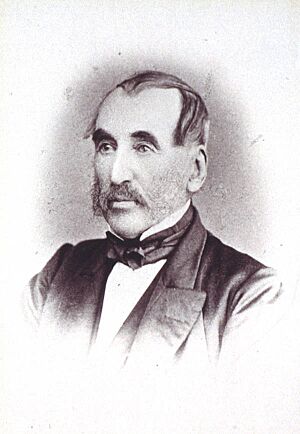Thomas Gregson facts for kids
Quick facts for kids
Thomas Gregson
|
|
|---|---|
 |
|
| 2nd Premier of Tasmania | |
| In office 26 February 1857 – 25 April 1857 |
|
| Governor | Sir Henry Young |
| Preceded by | William Champ |
| Succeeded by | William Weston |
| Personal details | |
| Born |
Thomas George Gregson
7 February 1796 Buckton, Northumberland, England, UK |
| Died | 4 January 1874 (aged 77) Risdon, Tasmania, Australia |
| Children | John Compton Gregson |
Thomas George Gregson (born February 7, 1796 – died January 4, 1874) was an important figure in early Tasmanian politics. He served as the second Premier of Tasmania, which is like being the leader of the government. His time as Premier was short, from February 26, 1857, to April 25, 1857. Gregson was known for fighting for people's rights and making big changes in the colony.
Early Life and Moving to Tasmania
Thomas Gregson was born in Buckton, Northumberland, England. His family had some disagreements, which led him to move far away. In 1821, he sailed to Van Diemen's Land, which is now known as Tasmania.
He arrived with a good amount of money, about £3000. This allowed him to receive a large piece of land, about 2500 acres (10 square kilometers). Later, he received another 1000 acres (4 square kilometers).
Gregson quickly became a Magistrate, a type of local judge. He also helped Andrew Bent, a newspaper publisher. They worked together to fight for freedom of the press. This meant people should be allowed to print their opinions without the government stopping them.
Thomas Gregson's Political Journey
Gregson became a member of the Tasmanian Legislative Council in July 1842. This was an important step in his political career.
Standing Up to the Governor
A few years later, in 1845, Gregson led a group against the governor, Sir John Eardley-Wilmot, 1st Baronet. The governor wanted to raise taxes on imported goods. Gregson and five other members of the council disagreed. They believed the colony could not afford these new taxes.
As a protest, Gregson and the five others resigned from their positions. They were known as "the patriotic six." The people of the colony supported them. They gave Gregson two thousand guineas (a lot of money) and a special piece of plate as a thank you.
Becoming Premier of Tasmania
In 1850, Gregson was elected to a new legislative council. When Tasmania gained "responsible government," meaning its leaders were chosen by the people, he was elected to the Tasmanian House of Assembly. He represented the area of Richmond starting in September 1856.
In February 1857, Gregson proposed a plan to lower the salaries of important government officials. This included the governor and other key leaders. His plan was approved. Because of this, the current government, led by William Champ, resigned.
Thomas Gregson then became the new Premier of Tasmania. He also took on the role of Colonial Secretary.
Challenges as Premier
Gregson's time as Premier was very short, lasting only about eight weeks. People found that he sometimes lacked moderation and self-control. His government was defeated, and he never held the office of Premier again.
Even after his time as Premier, Gregson remained active in politics. He often criticized other governments. In 1862, he faced some challenges in parliament. He was even removed from the house on one occasion. He retired from parliament shortly before he passed away in 1874.
His son, John Compton Gregson, was also involved in politics. He was a lawyer and served as Attorney-General in his father's government.
Gregson's Lasting Impact
Thomas Gregson was also a talented amateur artist. He showed his artwork at the first art exhibitions in Hobart in 1845 and 1846. One of his sketches, showing the Reverend Robert Knopwood on his horse, is still displayed today.
Gregson worked very hard for the good of Tasmania. He focused so much on the colony that he didn't always look after his own finances. He died without much money.
He was especially important for being a reformer in his early years. He fought for several key rights:
- Freedom of the press, so newspapers could report freely.
- The right to a trial by jury, meaning people accused of crimes would be judged by ordinary citizens.
- The end of penal transportation, which was the practice of sending criminals from Britain to Australia.
His 58 days as Premier is the shortest time anyone has held that position in Tasmania's history.
Images for kids
 | Chris Smalls |
 | Fred Hampton |
 | Ralph Abernathy |


